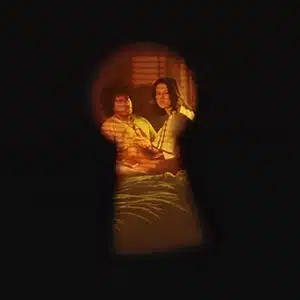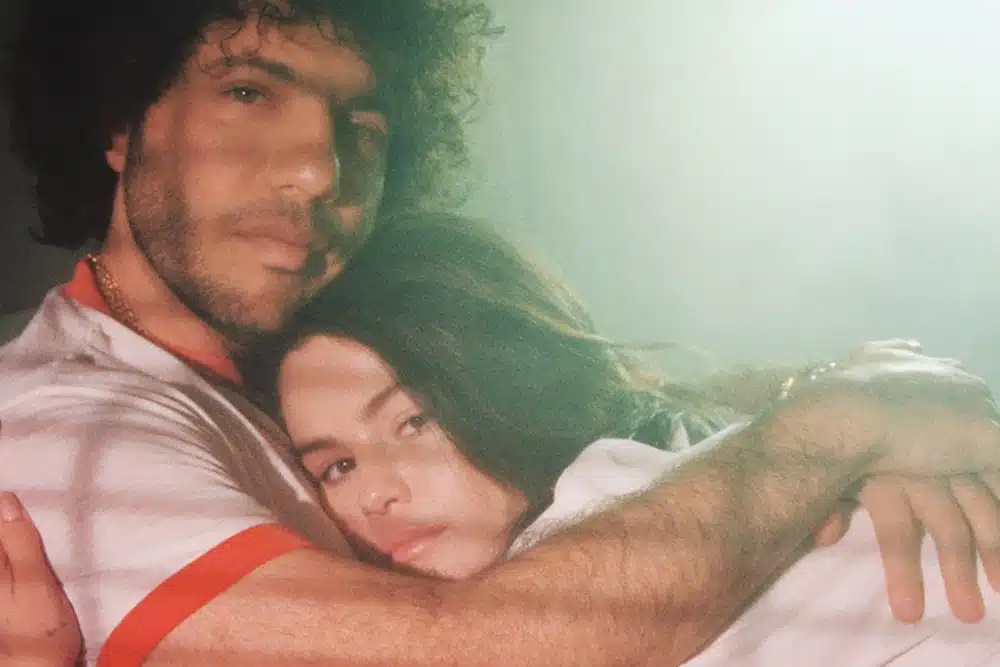
Selena Gomez’s fourth album zooms out on her celebrity presence, zooms in on her personal life, and hints at happiness and conflict.
 I Said I Love You First Selena Gomez Interscope 21 March 2025
I Said I Love You First Selena Gomez Interscope 21 March 2025
I Said I Love You First, the title of singer and actress Selena Gomez’s fourth studio album, is a blunt statement, hinting at happiness and conflict. A listener might wonder, “Why did one partner say, ‘I love you’ first?” Did the other hesitate? While promoting the record, Gomez and fiancé Benny Blanco, her main collaborator, projected domestic bliss. On The Tonight Show, they come across as media-trained to be charmingly opposite: Blanco verbose and likeable, Gomez refined and thoughtful.
The album is a canvas for their dynamic, as it discusses a love that blossomed in private, but packages it for the world to see. Of the pair’s creative process, Blanco told Rolling Stone, “She’d wake up, I’d write what was on her mind. Then we’d go into the other room and create it, and it became a song.”

Gomez’s previous record, 2020’s Rare, broke from the style of 2015’s Revival and several stand-alone singles released in 2017. While the earlier work combined Gomez’s low, breathy register with slick, EDM-style production to create reliable radio hits, Rare imbued this formula with authenticity, transforming a chart-baiting formula into something new. “Lose You to Love Me”, Rare’s lead single, a gospel-inspired ballad of lost love, ascended to number one on the Billboard Hot 100.
I Said I Love You First echoes Rare‘s tone while moving its story forward. The earlier record’s narrator was emerging from the shards of a broken relationship, piecing herself back together with self-affirming dance pop. The new album’s voice is reflective and confident, but reliant on the same stripped-back writing.
Before the LP’s release, Gomez told Rolling Stone, “My strength in music would be storytelling and…a low register and softer tone.” By committing to areas of expertise, Gomez conveys emotion concisely and accurately. An artist with a larger vocal range could still produce a scattershot album if their viewpoint were unfocused.
Despite its streamlined nature, I Said I Love You First contains several nuggets of celebrity gossip. “Don’t Take It Personally” and “How Does It Feel to Be Forgotten” feel aimed at Hailey Bieber, formerly Baldwin, the wife of Gomez’s ex-boyfriend Justin Bieber. (Gomez and Bieber dated on-and-off for nearly a decade, while Baldwin and Bieber married after six months.) Although Baldwin and Bieber wound up together, Gomez’s intonation, “Don’t waste all your energy/we both know that he loves me”, feels like a valid emotional truth.
Elsewhere, “Bluest Flame”, an uncomplicated dance-pop track, thrives on repetitiveness, allowing Blanco to traverse between rapid hyperpop strumming and a low bass. “Call Me When You Break Up”, featuring Gracie Abrams, is a reliably catchy kiss-off packed with witty lyrical turns of phrase.
“Younger and Hotter Than Me”, a wistful reflection on the passage of time, allows Gomez to unpack celebrity baggage. In the song’s music video, Gomez spends the night on a film set, draped in curtains that resembles the layout of Wizards of Waverly Place, the Disney show that made her a star. By returning to the origin of her career, without explicitly revealing the identity of the setting, Gomez zeroes in on a truth about fame that her peer Taylor Swift mentioned in the 2020 documentary Miss Americana: celebrities are often “frozen at the age they got famous”.
Although Selena Gomez has transcended her Disney beginnings, the willingness of “Younger and Hotter Than Me” to embrace the past displays Gomez’s comfort with the contours of her empire. Many former Disney stars distance themselves from their squeaky-clean starting point. But by using her relationship to Wizards to kickstart a discussion about coming-of-age, Gomez proves the nature of her initial fame is arbitrary. She has been telling the same story all along.
Although it offers heartfelt insights about romantic relationships, the greatest strength of I Said I Love You First is its commentary on celebrity. The title track, which opens the album, features no music. In a monologue, Gomez thanks a group of collaborators: “You’ve watched me grow up and I hope that I won’t let you down.”
Such a prominent display of affection could come across as sappy or self-congratulatory, a celebrity showcasing her own graciousness. However, a small detail adds depth: throughout the speech, the shuttering of camera lenses can be heard. On this track, Gomez is not being performatively thankful, but calling attention to the microscope she lives under. This self-reference resembles Taylor Swift’s “I Know Places”, a song about seeking privacy, bookended by a clicking tape recorder.
Gomez continues to parody herself on a second spoken-word interlude, “Do You Wanna Be Perfect”. The clip begins as an ad for a beauty product where a perky voice quips, “Now for six easy payments of a hundred thirty-nine dollars…” Gomez interjects, “Be exactly who you are. There’s no one like you.” Once again, the diatribe sounds cheesy, until you remember Gomez is the founder of a billion-dollar make-up company, Rare Beauty, specializing in products that create natural looks. Gomez is satirizing her business model: “authenticity” is a concept that can be bought and sold.
The closer “Scared of Loving You”, produced by Finneas O’Connell, epitomizes the revised goal of a Selena Gomez song: through quiet reflection, it gestures to surrounding noise. The cover art of I Said I Love You shows Gomez and Blanco through a keyhole, staring back at the viewer. Privacy and intimacy are worth fighting for in any person’s life, not just celebrities. Gomez and Blanco use their fame to make the point that an intrusion is an intrusion, no matter the circumstance.
As a Disney star, Selena Gomez had the opportunity to create music early in her career, signing to Hollywood Records. Becoming an adult means selecting the aspects of childhood you would like to hold on to, and maintaining them on your own terms. The autobiographical style of Rare and I Said I Love You First proves that Gomez has accomplished this task, making music in a way that works for her. However, as the video for “Younger and Hotter Than Me” implies, she may always linger within the keyhole where we first glimpsed her.


